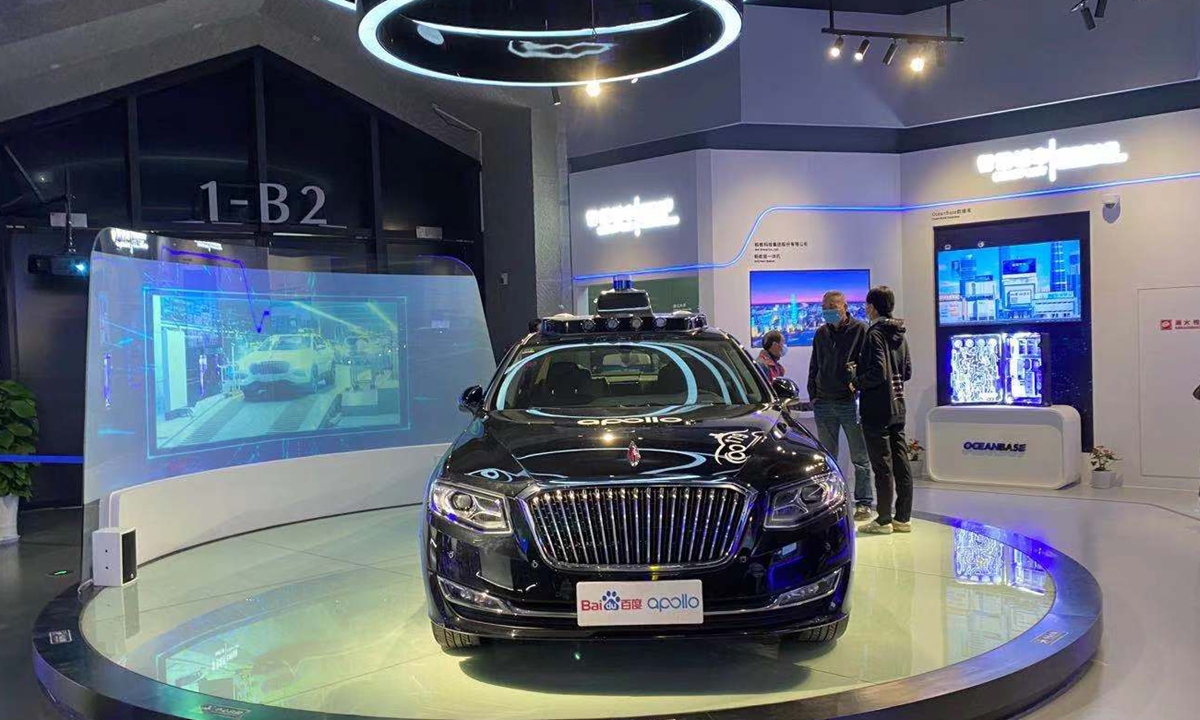China in driver’s seat to push digital innovation
Source: Global Times Published: 2020/11/24 19:38:40
China in driver’s seat to push digital innovation: expert

Baidu's autonomous driving solution on display at the World Internet Conference in Wuzhen on Tuesday Photo: Li Qiaoyi/GT
Despite the COVID-19 pandemic, China remains firmly in the driver's seat to push for do-mestic innovation and digitalization, a conclusion widely agreed on at the annual World Internet Conference (WIC) that ended on Tuesday.
The Chinese solution to internet development and governance has gained broad ac-ceptance at this year's event, Qi Xiaoxia, director-general of the Bureau of International Cooperation at the Cyberspace Administration of China, told a media briefing at the WIC gathering in Wuzhen, East China's Zhejiang Province.
More than 530 guests attended the conference in person, while others took part virtually. Attendees, both in-person or via video link, included foreign government officials, senior representatives of international organizations, academicians and executives of internet giants including Qualcomm and Cisco, according to Qi.
A list of 15 world-class internet achievements from Chinese heavyweights including Tencent, Alibaba and Baidu - as well as foreign giants such as Microsoft and Qualcomm - was unveiled at the WIC.
The achievements were chosen from more than 300 technological attainments filed by candidates from countries and regions including China, the US, Russia, Germany, France, Sweden, Canada and Belgium, ranging from digitized social governance to global responses to public crises to artificial intelligence-enabled and cloud-based life, according to the conference organizers.
A new services-oriented customized network framework headed by Liu Yunjie, a member of the Chinese Academy of Engineering and head of the Jiangsu Future Networks Innovation Institute, made this year's list.
The traditional internet is known for transmitting data, suggesting more attempts to ensure data transmission if initial attempts fail. This renders it impossible to provide services with low network latency and jitter. With the internet integrating into the real economy, a huge challenge is afoot, Liu said.
The customized network framework, an innovative approach to addressing inelastic de-mand for the industrial internet, tremendously lowers users' costs, he went on to say.
Chinese internet majors showed themselves to be technically ready for the nation to be-come a trendsetter.
At a panel on AI empowering economic innovation and upgrading as part of the WIC on Tuesday, Wang Gang, vice president of Alibaba Cloud and head of the Autonomous Driving Lab of Alibaba's research and innovation institute DAMO Academy, said that since the academy's establishment in 2017, 15 labs have been set up, covering data intelligence, chips and unmanned driving.
"We want to face the future, meaning the use of technology to solve problems," Wang said, noting that the technologies the company is hoping for would be forward-looking and eyeing an "incremental market rather than an inventory market."
In a statement sent to the Global Times, Baidu - which also made the achievement list with its Apollo ACE (autonomous driving, connected road and efficient mobility) smart traffic engine - said it envisions becoming an AI-powered vanguard to build national strength in transportation.
Newspaper headline: China in driver’s seat to push digital innovation: expert
Posted in: INDUSTRIES,ECONOMY